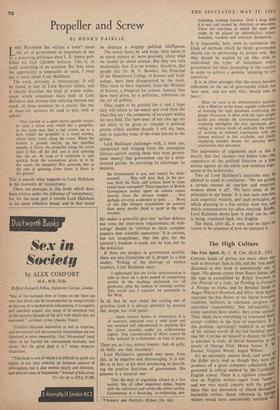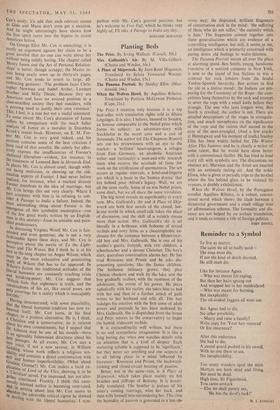The High Culture
The Free Spirit. By C. B. Cox. (O.U.P., 25s.) CERTAIN kinds of person are more often met with in literature than in life, and the 'free spirit' discussed in this book is undoubtedly one of them. The phrase comes from Henry James, and the type is exemplified by Ralph Touchett in The Portrait of a Lady, by Fielding in Forster's A Passage to India, and by Bernard Sands to Angus Wilson's Hemlock and After. Such figures represent the fine flower of the liberal humanist tradition; believers in tolerance, progress and individual responsibility. Not infrequently, 35 many novelists have shown, they come unstuck. Their ideals have everything to commend then'', except viability in the face of experience. It i5 this problem, agonisingly rendered in so many of the serious novels of the last hundred )(earl' that Mr. Cox has set himself to discuss; his boo" is subtitled 'a study of liberal humanism in the novels of George Eliot, Henry James, E. M' Forster, Virginia Woolf, Angus Wilson.' It's an extremely uneven book, and some of the duller parts read as though they were the products of a giant computer collectively Pro' grammed in critical method by the Cambridge English school. There is a rigorous concentra" tion on English writers—apart from James", and not very much concern with the genera' ideas that any discussion of liberal humanist inevitably evokes. Some reference to forego writers would have considerably enriched MI'
Cox's study; it's odd that such relevant names as Gide and Mann don't even get a mention. And he might interestingly have shown how the free spirit turns into the hipster in recent American fiction.
On George Eliot Mr. Cox is unexciting; it is surely an argument against her claim to be a great novelist that no one can write about her without being mildly boring. The chapter called `Henry James and the Art of Personal Relation- ships' is better, though scrappy; the Master re- sists being neatly sewn up in thirty-six pages, and Mr. Cox tends to resort to large, all- embracing gestures: 'The problem faces Chris- topher Newman and Isabel Archer, Lambert Strether and Milly Theale. Because they are American and have no assured position in a class-stratified society they feel outsiders, with a pressing need to justify their own existence.' This, I feel, is a true but •not a useful statement. To some extent Mr. Cox's discussion of James suffers by comparison with the much fuller analysis of James as a moralist in Dorothea Krook's recent book. However, on E. M. For- ster Mr. Cox is very good indeed, and his account contains some of the best criticism I have read of that novelist. He calmly but effec- tively exposes the insufficiencies of Forster's sheltered liberalism--evident, for instance, in the treatment of Leonard Bast in Ho wards End. In places Mr. Cox is almost cruel, though with7 not being malicious, in showing up the old- maidish aspects of Forster; I had never before realised, for instance, what a marked distaste Forster manifests to the idea of marriage; but Mr. Cox brings this out very clearly. Where I Part company with him, is in refusing to con- sider A Passage to India a failure. Indeed, the most astonishing thing about Forster is the emergence of this symbolist masterpiece—one of the few great works written by an English-
man in this oentury—from its amiable and paro- chial predecessors.
In discussing Virginia Woolf Mr. Cox is fair- minded and even generous; she is not a very fashionable figure these days, and Mr. Cox is Perceptive about the merits of To the Light- house and The Waves. But I think he is at his best in the long chapter on Angus Wilson, which must be the most exhaustive and penetrating WilWilson's of Wilson that has so far appeared. In son's fiction the traditional attitudes of the liberal humanist are constantly reaching crisis and breaking-point; Mr. Cox suggests that Wilson feels that nightmare is truth, and the constructions of his art, like social' poses, are only coverings for a reality which is inescapably horrible.'
that demonstrated, with some plausibility, _ at the liberal humanist tradition has now ex- hausted itself, Mr. Cox turns, in his final chapter, to a positive alternative. He is, I think, :LChristian and a conservative; he is reticent trnt his own commitments, but 1 suspect that is Johnson may be one of his models—there best agreeably Johnsonian directness about his hew Passages. At all events, Mr. Cox sees a Golding, whose if not a new saviour, in William sibiiltig, whose work reflects a religious sen- e„litY and contains a direct confrontation with Graham and human imperfectibility. (What about pu,.anarn Greene?) Mr. Cox makes a lucid ex- a ,cation of Lord of the Flies, showing it to be `nristian' novel. I'm impressed, but not alto- gether convinced. Frankly, I think this enor-
;r !Y talented author is becoming over-rated,
abandon 1.o writing about him Mr. Cox seems to zAn_clon the admirable critical rigour he showed
dealing With the liberal humanists. I sym-
pathise with Mr. Cox's general position; but he's welcome to Free Fall, which he thinks very highly of; I'll take A Passage to India any day.
BERNARD BERGONZI



































 Previous page
Previous page